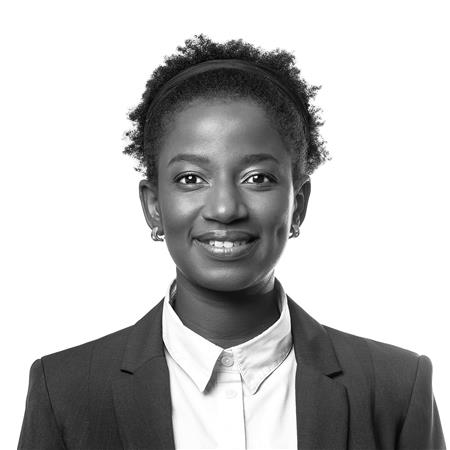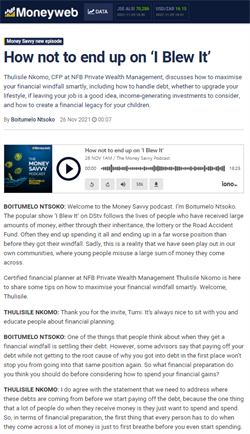[Podcast] How not to end up on ‘I Blew It’
Don't become a statistic: your financial advisor is an asset in ensuring that you make the best decisions and avoid the pitfalls when a financial windfall comes your way.

![[Podcast] How not to end up on ‘I Blew It’ [Podcast] How not to end up on ‘I Blew It’](https://nfb.co.za/images/default-source/news/thuli-how-not-to-end-up-on--blew-it-moneyweb-podcast-detailpagebanner.jpg?sfvrsn=61968142_0&size=1140)
No one wants to end up on the TV show 'I Blew It'. On the latest episode of MoneyWeb's #MoneySavvy podcast Thulisile Nkomo, CFP® at NFB Private Wealth Management, discusses how to maximise your financial windfall smartly, including how to handle debt, whether to upgrade your lifestyle, if leaving your job is a good idea, income-generating investments to consider, and how to create a financial legacy for your children.
Podcast transcript:
BOITUMELO NTSOKO: Welcome to the Money Savvy podcast. I’m Boitumelo Ntsoko. The popular show ‘I Blew It’ on DStv follows the lives of people who have received large amounts of money, either through their inheritance, the lottery or the Road Accident Fund. Often they end up spending it all and ending up in a far worse position than before they got their windfall. Sadly, this is a reality that we have seen play out in our own communities, where young people misuse a large sum of money they come across.
Certified financial planner at NFP Private Wealth Management Thulisile Nkomo is here to share some tips on how to maximise your financial windfall smartly. Welcome, Thulisile.
THULISILE NKOMO: Thank you for the invite, Tumi. It’s always nice to sit with you and educate people about financial planning.
BOITUMELO NTSOKO: One of the things that people think about when they get a financial windfall is settling their debt. However, some advisors say that paying off your debt while not getting to the root cause of why you got into debt in the first place won’t stop you from going into that same position again. So what financial preparation do you think you should do before considering how to spend your financial gains?
THULISILE NKOMO: I do agree with the statement that we need to address where these debts are coming from before we start paying off the debt, because the one thing that a lot of people do when they receive money is they just want to spend and spend. So, in terms of financial preparation, the first thing that every person has to do when they come across a lot of money is just to first breathe before you even start spending.
The second one is not to tell your family members, because family members, when you have a lot of money, all suddenly become financial advisors and all want you to assist them with some sort of problems or whatever businesses they are trying to start up.
You need to assess your financial situation by looking at all your debts and determining how you got into those debts in the first place. This will assist you in terms of how you spend your money in the future so that you don’t find yourself in the debt trap in the future.
BOITUMELO NTSOKO: Now, when would you then approach a financial planner to help you out?
THULISILE NKOMO: As soon as you know that you’ve got money; I think that’s the most important thing. Like I said, family is the worst [group of] people to tell. I see it with my own clients; as soon as they’ve got a cash lump sum coming up their way, everybody has an idea of how they should be best investing the money.
So it is very, very important to start consulting with a financial advisor when you know that you’ve got money coming your way, because [a financial advisor] will help you in coming up with a plan to say, ‘What debts do you have? How do we best address this? What do we do with this money? Whatever is left, how do we deal with it?’ And if there’s anything that you want to buy – let’s say you are planning on buying a house or a car – you can start talking about all those things. They’ll help you setting up a financial plan in terms of how you best address your financial situation, which would be your debt. If there’s anything left, then look at any future investments that you can make with that money.
BOITUMELO NTSOKO: Just staying on that whole debt situation, how would you then decide which debt to pay off first?
THULISILE NKOMO: Debts are very tricky. A lot of people think that a small debt is not a big debt. How you look at debt is [as follows]. What is the interest? You’ll see that generally for unsecured debt – those debts without collateral and which are very high in interest – you’ll find that you pay more interest on those debts. So it’s very, very important to pay off those high interest-bearing debts. Then you come to those that are lower interest-bearing. The lower-interest ones are those that have collateral, like a house and a car.
So it is very, very important that people look at paying off the high interest-bearing debt, which is those loans. Then come down to the other debts, those with low interest. That’s going to help by increasing your cashflow.
BOITUMELO NTSOKO: With debt out of the way, should you then turn your focus to investing for retirement?
THULISILE NKOMO: Certainly, why not? I look at a lot of young people – especially in the entertainment industry, or those who work in an industry where they can make a lot of money – where they spend a lot of money today and forget about tomorrow.
So when you come up with a lot of money, it is very, very important to take that money and plan for tomorrow. It doesn’t mean you now take all your money and start planning for retirement, but a portion of it needs to make sure that you’ve got some money for retirement. Then a portion of it you can use for today, because you can’t just stop living today because you think about tomorrow.
So it is very, very important that they focus on what they can invest in, in terms of retirement, and by saving for retirement, not only retirement products. There are other ways to invest for retirement, which a financial advisor can assist in giving direction as to the best way to invest the money. So I do agree that your focus should also be turned to retirement – so that you can still live well, even when you’re old.
BOITUMELO NTSOKO: You’ve just mentioned some other ways – instead of the normal retirement products. What other ways are there, just to give us a sense of what we should be looking at?
THULISILE NKOMO: First of all, when we look at long-term savings, retirement is part of that. How I like to break it down is, first of all, [often] when people have kids, I would say they should look at saving towards the kids’ education or for the long term, because some kids have the potential to become entrepreneurs and you want to make sure that you can help them start out their lives. So you can save that money into long-term savings with better interest, or like investing in equities, unit trusts and ETFs – all of that, depending on what clients are looking for.
It’s very, very difficult; there’s no one-time solution for each client because there’s a lot of long-term investment [types]. Some can be offshore, some can be endowments. So it’s very, very important to understand what the client is trying to achieve.
I think the other thing that is not spoken about, or not encouraged a lot, is other long-term investments, which can be into personal education and development because, if you as a person have goals to study so that studying can better your life, that is a long-term investment in your life. Some people want to go into business, so that will also assist them.
There are lots of ways to invest in yourself long term. There’s not just one solution towards that – it depends from person to person.
BOITUMELO NTSOKO: I think that’s an important point that you mentioned because, if you’ve educated yourself, even if you do run out of money, you still have something to fall back on and you can possibly continue with a new career.
THULISILE NKOMO: Exactly. It’s one thing that a lot of people downplay a lot, but investment in self is so, so important because you can generate some income with whatever skill you get as a person. When people think long term, they think it’s money only that is invested. It’s personal development.
Just investing in things that you want, you can set out a budget to say: this is how much I want to invest in myself, this is how much I want to invest in long-term products, this is how much I want to invest in my kids. It differs from person to person. Hence a financial advisor would help you because they are human beings. You’re not going to a machine to say, ‘After this, what do I do?’ They will understand your personal circumstances and give you direction on how to best do it.
BOITUMELO NTSOKO: Now, let’s say you want to earn an income from your investments, which products should you look at?
THULISILE NKOMO: What is very important is to put money into liquid investment, where you’re able to draw an income, such as your unit trust. A lot of times people put their money in products that are not suited for their needs. Let’s say a client has a R1 million and says, ‘I want to receive maybe R6 000. If you put them in the Swix products they’ll be able to get that.
Then they [might] come back and say, ‘Oh, but I want R10 000’; so it’s very, very important to have clients in liquid products, especially if they want to earn income from their investments because fixed investments like endowments, where they’ll say where you put the money – let’s say it’s a million rand – you get this on a monthly basis. If you decide that you want to surrender it before time, you might be penalised.
So just for income a liquid investment is much better; especially when people come in, when they learn they have a lot of money for the first time, they don’t know what they want, so it’s easy for them to under-estimate what they want and in future come back to change things. Then a liquid investment is very, very important into a low-risk investment, so that it gives them room to actually draw the money when they need the money.
BOITUMELO NTSOKO: Now, should you take a portion of your funds and create an emergency fund – and which product is best suited for this?
THULISILE NKOMO: Definitely. Life happens. I think during Covid we all saw that some people didn’t have jobs and then couldn’t meet their obligations. So, just like any person, when you’ve a lot of money some money may be in long-term investments, but with a short-term investment, you can look at, say, your savings investments with interest, such as call accounts. In an emergency you need you money to be accessible. So investment instruments like call accounts [are] very important because, if you need money, you are able to access the money. I think the worst thing is having the money but not having access to it. Definitely I’d say a portion needs to go to an emergency [fund]. An emergency could be anything; you could be going to hospital and there’s not enough funds and you need to pay in. So definitely a portion needs to go towards an emergency fund because life does happen.
BOITUMELO NTSOKO: When we play the Lotto, a lot of us dream about buying ourselves a big mansion and two fancy cars. What happens then when you get a big financial windfall and you start considering a bigger house or buying a better car? What’s your recommendation on this?
THULISILE NKOMO: I think everyone who plays the Lotto does want a big house and that expensive car. They need to keep in mind that with a bigger house come bigger expenses. Let’s say you were staying in a location, and now you want to move to a suburb; the suburb comes with higher expenses like your levy, your higher rates and taxes, your higher interest costs. People need to take that into account. So if you decide that you want a big house, do your research in terms of how much it’s going to cost you, because if you take all your money and invest it in that house, you need to consider whether you will be able to afford it when that money is finished, because maintenance needs to happen. You often see that people who have all this money buy those big houses, and then end up selling at a loss because they did not do their homework.
An expensive car – I would also like to own a very expensive car – also comes back to maintenance. You need to find out how much it’s going to cost you to maintain that expensive car, because anything expensive is also expensive to maintain. So you need to be in a position where you are real with yourself, and say, do I need it or do I want to need it? If you want to need it, do you know the answer, because as soon as you have a lot of money you start having a very expensive appetite for expensive things, but you need to make sure that you will be able to maintain and keep it for the long term. That’s where a lot of people fail. They go for big things which they will not be able to maintain in the long term, and then end up selling at a discount – which is not a good thing. Therefore they should realise their financial situation, and [ask], ‘Does this really make financial sense in my life?’ If it doesn’t, then they don’t have to do it.
BOITUMELO NTSOKO: With a little more financial freedom, some people may consider leaving their job. Do you think this is a good idea?
THULISILE NKOMO: I personally would not encourage a person to leave their job as soon as they have a lot of money. Remember, at a job you earn an income. If you are now going to leave your job to live off the money that you have, you need to make sure that money is enough to cover you until death – because that’s the risk that you put yourself in. So I would never encourage anybody to leave their job just because they’ve got a lot of money, unless that money is able to sustain you until death – when definitely you should. But if it’s not, don’t leave your job because you will earn income from your job while your investment or pot of money grows on the side. So I would never encourage that from a person.
BOITUMELO NTSOKO: Now, for those who are considering using the windfall to start a business, what are some of the factors that they need to consider?
THULISILE NKOMO: I think a very important thing is that a lot of people admire businesswomen and men out there, but they don’t know what goes into starting a business. I look at most of my clients who are business owners, where they say when they started their business they couldn’t afford to pay themselves. They could pay everybody else, but not themselves. So people need to remember that a business is not a guaranteed investment. It’s high risk, high return. Therefore they need to understand what they’re getting themselves into.
They need to do the homework before they go into business. Just going into a business doesn’t mean the business is going to be successful, so I would not. If you know what you’re getting yourself into, you need to know the pros and cons of going into the business; just going into business doesn’t mean a business is going to be successful.
So it’s very, very important to just understand that, just like any investment, a business is high-risk, high returns. If it works, it’s nice. But if it doesn’t, then you stand a chance of losing your money. It depends from person to person. So if you know what you’re getting yourself into and you’re ready for the risk, then you should go for it. But if you don’t, I would not encourage a person to start their business, especially if they don’t know anything about the business or what they’re getting themselves into.
BOITUMELO NTSOKO: Now a lot of us who have children want to create a financial legacy for our children. How can you then maximise the funds that you have come into to do this?
THULISILE NKOMO: I think the first thing is to make the right decision by partnering with someone that cares about you and wants to help you with regard to your financial goals, because now that you have money, you still need to have financial goals.
One would be to say you want your money to last [long] enough so that you have enough money to spend for their education, and there’s enough money for them to set up, because a lot of children who grow up, when they start up, have to start from the bottom. Hence they borrow. That’s why a lot of the middle class is in debt because they started their life by borrowing a lot. If you have money, say, you need to make sure there’s enough money for their education, and also a separate investment vehicle so that they can have access to the money to kickstart their future, because that will make such a big difference in your child’s life.
If I think about myself, when I started working I had to borrow money to buy a car, I had to borrow money to buy a house. But if there had been money available to help me start all this, I wouldn’t have made the mistakes I made. I wouldn’t have borrowed as much as I did. So it is very, very important to set up their financial futures by making sure there’s enough money to set them up when they start out as adults, because that will make a big difference in their lives and in the choices that they make in the future.
I think the one most important thing is just to educate and empower them, because that will make sure that there is a financial legacy in the family. When they know and understand financial education they are able to make financial decisions in their future and they [won’t] make the same mistakes that their parents made. That’s the best financial legacy you can leave for your children.
BOITUMELO NTSOKO: Thank you, Thulisile. That was Thulisile Nkomo, who is a certified financial planner at NFB Private Wealth Management.
 |
The Money Savvy podcast "How not to end up on ‘I Blew It’" was originally published on Moneyweb |
||













